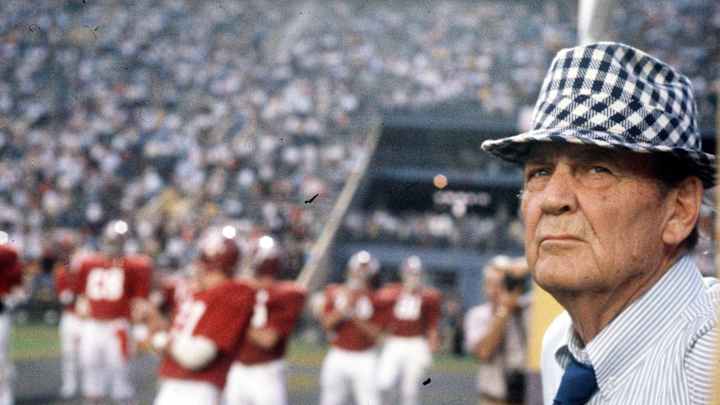Tale of the Coaching Tape: Nick Saban vs. Paul W. “Bear” Bryant

As part of the 150th anniversary of college football, BamaCentral has been comparing Nick Saban’s numbers to the all-time greats.
Whenever possible, the best coach of the upcoming opposing team on Alabama’s schedule has been the one profiled.
Well, even though he was only there four years (1954-57), and Homer Norton won the national championship in 1939, Paul W. “Bear” Bryant is undoubtably the best coach the Aggies ever had.
Sort of like with Saban and LSU, fans in Texas still wonder what might have happened had he not left. In the big picture, they might be 1 and 1A on the ultimate list of best college football coaches ever.
Here’s how a good of a football coach Bryant was:
From 1946-53, his teams enjoyed eight straight winning seasons to go with appearances in the Orange, Sugar and Cotton bowls, and captured the program’s first Southeastern Conference title in 1950. That season capped with an invitation to face Oklahoma in the Sugar Bowl, which may have seemed like a looming execution considering Bud Wilkinson’s Sooners were riding a 31-game winning streak.
Only Bryant came out on top, 13-7 … with Kentucky.
Yes, the Wildcats, who have since won just one other SEC title, in 1976, and that was shared with Georgia.
Bryant famously made his initial mark at Texas A&M during training camp in 1954, when he took players 250 miles west to a barren army base in Junction, Texas, and put them through the mental and physical equivalent of a meat grinder. More than two-thirds of the players quit, with those who endured dubbed the “Junction Boys,” but it also defined the coach’s legacy as a hard-nosed disciplinarian.
"I don't want ordinary people," Bryant was quoted as saying. "I want people who are willing to sacrifice and do without a lot of those things ordinary students get to do. That's what it takes to win.”
Bryant’s Aggies were closing in on the 1957 national championship when he was lured away by Alabama and made his famous statement: “Mama called, and when Mama calls, then you just have to come running.”
Although originally from Arkansas, where he was born, it was in Tuscaloosa where Bryant changed more lives that he ever knew, and made his biggest impact. It’s also where the man who is still regularly quoted for saying, “I ain’t never been nothing but a winner,” did just that, win, a lot.
During his amazing 25 years with Crimson Tide, Bryant lost just 46 games, compared to 232 wins. No program in the nation won more than Alabama in both the 1960s and 1970s, as he’s considered the only college football coach since the Associated Press poll was created in 1936 to successfully lead not one, but two dynasties.
"He wasn't just a coach," former Southern California coach John McKay once said. "He was THE coach."
During his 38-year career, only nine of Bryant’s teams finished unranked – including each of his first four years (1945 Maryland, 1946-48 Kentucky) – compared to 22 winding up in the top 10. He took 29 teams to bowl games and led 15 to conference championships.
Bryant set a similar standard in the Southeastern Conference with 159 regular-season league wins, which not only remains the record, but just three others have managed to top the century mark. He was named the SEC’s coach of the year an incredible 12 times.
No coach had his presence, either, as Bryant, the epitome of toughness, became a symbol for a troubled state and region, and an iconic presence that transcended college football. Even his nickname, which stuck after he actually wrestled a bear at a carnival as a teen, reflected his fierceness as a player with the Crimson Tide in the 1930s, and his stature as a coach.
“Bear Bryant is probably the greatest coach in college football in terms of what he accomplished, what his legacy is,” Nick Saban said. “I think the biggest thing that impacts me is how many peoples' lives he affected in a positive way, players who played for him, because they all come back and say how he affected their life. They don't come back and say, ‘We won a championship in '78, '79, '61,’ whenever it was. They come back and say how he affected their lives. There's a lot of Bear Bryant stories that I've learned a lot from, that have made me a better person.
“I certainly appreciate that, have a tremendous amount of respect for what he accomplished. There's no way that we have done anything close to what he's done in terms of his consistency over time, how he changed what he did to impact the times.”
When Bryant retired he was Division I's all-time winningest coach with 323 wins He guided his teams to 29 bowl appearances, 15 conference championships, won an SEC-record 146 games, 13 league titles and six national championships, five consensus. No program won more games than Alabama (193-32-5) in both the 1960s and 1970s.
"He was simply the best there ever was," former Nebraska coach Bob Devaney said of his peer.

Even though Bryant died January 26, 1983 at the age of 69, hardly a day goes by that most Crimson Tide fans still don’t mention his name at least once, while books and documentaries are still being made about him and his legacy. Fans still proudly wear the pattern of his trademark houndstooth hat around campus, and a good part of Tuscaloosa has been named in his honor.
He was the one who set the standard.
“Coach Bryant, in his tenure here, to have the kind of success that he had over time, consistency in performance over all that time and winning all those championships, the intangibles that his teams always seemed to play with, are the things that you really try to get your team to do,” Saban said. “Whether it's the physical toughness, the effort, the finishing, the discipline to execute.
“I know that when I first started coaching, I read Coach Bryant's book and it had a tremendous impact on me, in terms of some of the important things that would help you be successful as a coach, and believe strongly in a lot of the same intangible type things in terms of character, attitude, discipline, hard work. That's the kind of program that we have here. I think that was the foundation really of his program.”
As a result, his shadow still looms large on the Capstone, similar to how the tower from which he watched practices stands like a monument.
“I don't think there's any question that there's probably only a few people in college athletics history who have had as great an impact, maybe John Wooden at UCLA,” Saban said about Bryant on what would have been his 100th birthday, September 11, 2013.
“I don't think you can really kind of put words into what it really has meant and how it has affected the University of Alabama.”
Nick Saban vs. Paul W. “Bear” Bryant
(For consistency reasons, statistics through 2018 season)
Category, Saban; Bryant
Seasons 23; 38
Consensus national titles 6; 5-z
Top five finishes 9; 13
Top 25 finishes 16; 29
Overall record 232–62–1*; 323-85-17
Percentage 78.5; 78.0
Losing seasons 0; 1
Bowl record/CFP record 14-10; 15-12-2
Percentage 58.3; 55.2
Conference titles 9; 15
Conference record 138-42-1; 177-57-10
Consensus All-Americans 41; 23
First-round draft picks 34; 18
Record against ranked teams 82-40; 63-43-5
Percentage 67.20; 59.73
Record against Top 10 teams 42-21; 33-23-1
Percentage 66.77; 58.77
Ratios/percentages
National title seasons One every 3.8 seasons; 7.6
Consensus All-Americans 1.78 every season; 0.61
First-round draft picks 1.48 every season; 0.47
Average wins vs. ranked teams 3.57 each season; 1.71
Wins over top-10 teams per year 1.82 every season; 0.87
z-Alabama claims 1973 for finishing first in the coaches’ poll, but Notre Dame is considered the consensus champion
Some of the information in this report was also used in the book "Nick Saban vs. College Football."
